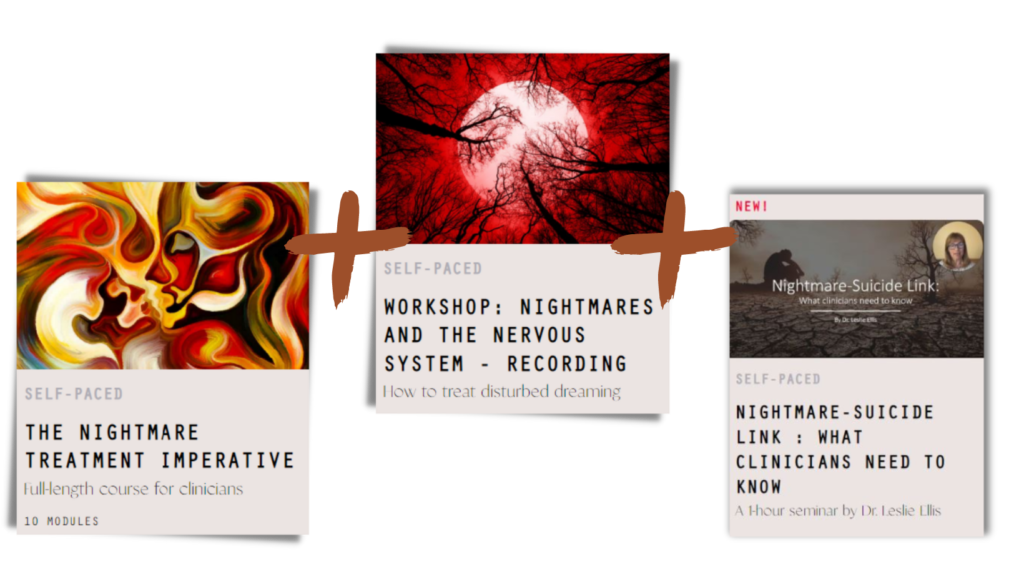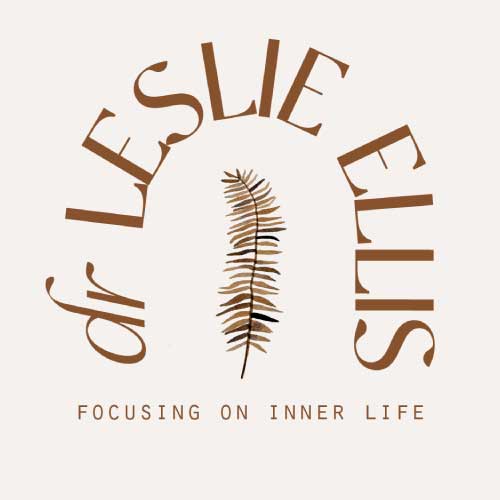Bundle: Nightmare Relief + Nightmares and the Nervous System + Nightmare-Suicide Link
A homestudy online course bundle
$460 $199 (Until Dec. 31, 2024)

By the end of this program, you will be able to:
⭐️ Describe what causes nightmares and who has them
⭐️ Explain when nightmares are of clinical concern
⭐️ Describe the parasomnias that are often confused with nightmares (sleep paralysis and night terrors) and how to treat them
⭐️ Demonstrate a clear sense of current best treatment practices and supporting research
⭐️ Explain the link between nightmares and suicide risk, and understand how to apply this information to diagnose and treat those at risk
⭐️ Discuss the way the autonomic nervous system is implicated in nightmares and apply this information to offer a polyvagal-informed approach to treatment
⭐️ Apply the Nightmare Relief protocol for the treatment of nightmares
Everyone has occasional nightmares, but do you know the features that make them cause for clinical concern? Do you know how to track dreams to diagnose mental health changes and suicide risk? Understanding how to diagnose and treat nightmares is critical knowledge for all mental health professionals (whether or not you work with dreams otherwise). Nightmares are deeply implicated in most forms of mental illness, and are particularly problematic for those with traumatic injury, depression and anxiety.
This course bundle offers everything you need to know about diagnosing and treating nightmares for only $460 $267!!
“I purchased your workshop on Nightmares and the Nervous System and just spent the day listening to it. It was really, really helpful! My team at Blooming Brains (here in East Vancouver) works with therapeutic technologies that interact with the nervous system to elicit safety and calm. Having a protocol to work with to support clients who have nightmares, and the information regarding the ripple effect on trauma symptoms overall, offers a really pragmatic and valuable piece of support for clients who are addressing trauma in therapy.”
– Cynthia Farnsworth,
Clinical Counselor, East Vancouver
Nightmare Relief:
A complete course for clinicians
Module 1: What are nightmares and who has them?
Module 2: Kinds of nightmares and implications for treatment
Module 3: The alarming nightmare-suicide link
Module 4: Talk: There are no bad dreams
Module 5: Parasomnias: Sleep paralysis, night terrors
Module 6: Why we have nightmares: Current theories
Module 7: An introduction to nightmares and the nervous system
Module 8: Nightmare treatment research and best practices
Module 9: The complete ‘Nightmare Relief Protocol’
Module 10: Demo of nightmare treatment
Nightmares and the Nervous System:
How to treat disturbed dreaming
3-HOUR RECORDED WORKSHOP
This workshop updates the nightmare course with Dr. Ellis’s most current thinking about how nightmares reflect a nervous system that does not feel safe. The talk was so well-received, we want to share it, along with supporting materials you would normally have to pay extra for.
You will receive:
- 3-hour workshop audio recording
A copy of Dr. Ellis’ powerpoint presentation
- Pre-publication copy of the academic article upon which this presentation is based: Solving the Nightmare Mystery: The autonomic nervous system as missing link in the aetiology and treatment of nightmares
Copy of a detailed case study on how to apply polyvagal theory to nightmare treatment
Dr. Ellis’ detailed speaking notes
Nightmare-Suicide Link webinar
A 1-hour seminar by Dr. Leslie Ellis
Suicide is a leading cause of death worldwide, especially among young people. We are not getting better at treating or predicting it. What is not well-known is that there is a robust and treatable link between nightmares and suicide.
This seminar covered the following:
- clear evidence linking nightmare frequency and suicide risk, a survey of the latest research
- the main clinical considerations, including how to track disturbed dreaming to better predict suicide
- mechanisms linking suicide and nightmares
- recommendations for treatment that can reduce self-harm
